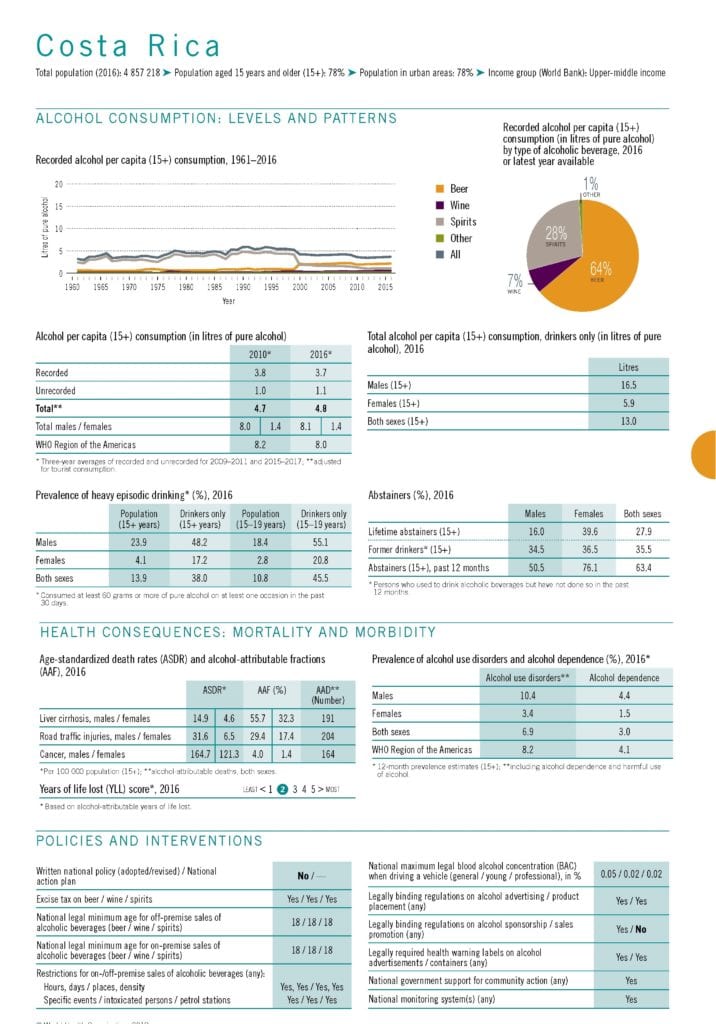Alcohol companies sabotage important public health standard
In Costa Rica, a country of 5,200,000 inhabitants in Central America, alcohol companies are required by law to place the message “Liquor consumption is harmful to health” on packaging and advertising. The phrase is mandatory.
But alcohol companies have been exposed for deliberately violating the law. As aDiarioCR.com reports, the alcohol industry is avoiding to include the mandatory phrase “Liquor consumption is harmful to health”. This alcohol industry strategy of sabotaging existing and important standards in Costa Rica has lead to thousands of examples of alcohol advertising on TV, radio, the web, social networks, billboards, and elsewhere without the message raising awareness of the harm caused by the products of the alcohol companies.
Ministry of health response
In Costa Rica, it is the Ministry of Health that has the authority to regulate this standard. According to aDiarioCR.com reporting, the Ministry empahsized that the regulation remains in force in accordance with Executive Decree 15449, Liquor Labeling, Article 8º:
Those natural or legal persons, who opt for the legend ‘Liquor abuse is harmful to health’, must not only incorporate it in the containers of all types of liquor, but this legend must also appear in any type of advertising that is carried out for the product, be it oral, written or visual, by any means of communication that is used. The size of the legend should be large and wide enough to be easily read.”
Executive Decree 15449, Liquor Labeling, Article 8º
The Ministry confirmed that this legend must be included either orally, in writing or visually, in any means of communication that is used to promote alcohol. The Ministry of Health also underlined that the message must be large and broad enough to be easily read.
Avalanche of alcohol promotions without health warnings
The reality is different as examples collected by aDiarioCR.com reveal.
Alcohol companies stopped including the health warning message on their marketing activities.
Thousands of examples have been gathered to document the alcohol industry’s sabotage strategy.
Sabotage is part of the Dubious 5 strategies of Big Alcohol: It is alcohol industry activity to avoid, violate, and undermine society’s rules, laws, and standards. Sabotage is Big Alcohol’s strategy to deliberately damage and undermine the proper functioning of societies’ institutions and their capacity to respond to the public interest.
aDiarioCR.com reporter Marianela Sanabria Leandro has collected examples of alcohol marketing activities on social media, billboards, and products in supermarkets to illustrate how widespread the sabotage practice of the mandatory health warning message in Costa Rica currently is.
Worsening standards undermines alcohol industry oversight
Criminal lawyer and former judge Ewald Acuña says that alcohol companies should receives fines for their sabotage of Costa Rican alcohol advertising and labeling standards.
Former Minister of Health, Dr. Giselle Amador, explained to aDiarioCR.com that the oversight and enforcement of the standards has been worsened in recent years. A 2012 regulation of commercial alcohol advertising lowered the existing standards for alcohol marketing practices in Costa Rica.
Through this regulation they moved the advertising control office of the Institute of Alcoholism and Drug Dependence, IAFA, where there were five officials who did their job very well, to the Ministry of Health, all in order to avoid control,” said former Minister of Health, Dr. Giselle Amador, as per aDiarioCR.com.
In fact, this regulation received an unconstitutionality action that was resolved in 2016, because it included 5 representatives in the Commission for the Regulation and Control of Commercial Advertising of alcoholic beverage companies, 3 from the Ministry of Health, 1 from the UCCAEP and another of the Advertising Agencies, which was a clear conflict of interest, since there were 2 representatives of private companies whose interest are in direct conflict with public health.”
Former Minister of Health, Dr. Giselle Amador
Clearly, the alcohol industry has interfered in the advertising and labelling standards, leading to their worsening.
The World Health Organization (WHO) recommends countries to ban alcohol advertising, sponsorship, and promotion completely or the at leadt comprehensively regulate it – to help protect people from alcohol harm.
Alcohol harm is serious and pervasive in Costa Rica, according to the WHO.
- More than 10% of Costa Rican men have an alcohol use disorder.
- More than half of young males engage in heavy episodic alcohol use.
- Adult men consume more than 16 liters of pure alcohol per year.
- More than 500 Costa Ricans die because of only three health issues: cancer, liver cirrhosis, and road traffic fatalities.
Former Minister of Health, Dr. Giselle Amador:
The interference of alcohol producers is disastrous, because they buy consciences. That’s why right now we’re fighting to stop alcohol ads from being allowed in sports.”
Former Minister of Health, Dr. Giselle Amador
According to Kristina Sperkova, President of Movendi International:
Alcohol is the leading risk factor for disease and disability in youth and young adults between the ages of 25 and 49.
Alcohol is the only psychoactive substance that causes more harm to others than to the users themselves. Socially it is the most harmful drug due to its broad psychological, social, physical and economic availability. The total damage, made up of damage to the consumer and third parties, is almost twice the burden of tobacco.
While alcohol warning labeling is not the most cost-effective alcohol policy solution, placing labels about alcohol’s cancer risk on alcohol products is an important part of a comprehensive approach to protecting people from the harms caused by alcohol.
Currently, there are very few countries in the world that have such advertising and labelling standards as Costa Rica. That’s why it matters to safeguard them from being watered down by alcohol industry interference, and to ensure full their implementation. People have a right to know that alcohol is harmful.”
Kristina Sperkova, International President, Movendi International

